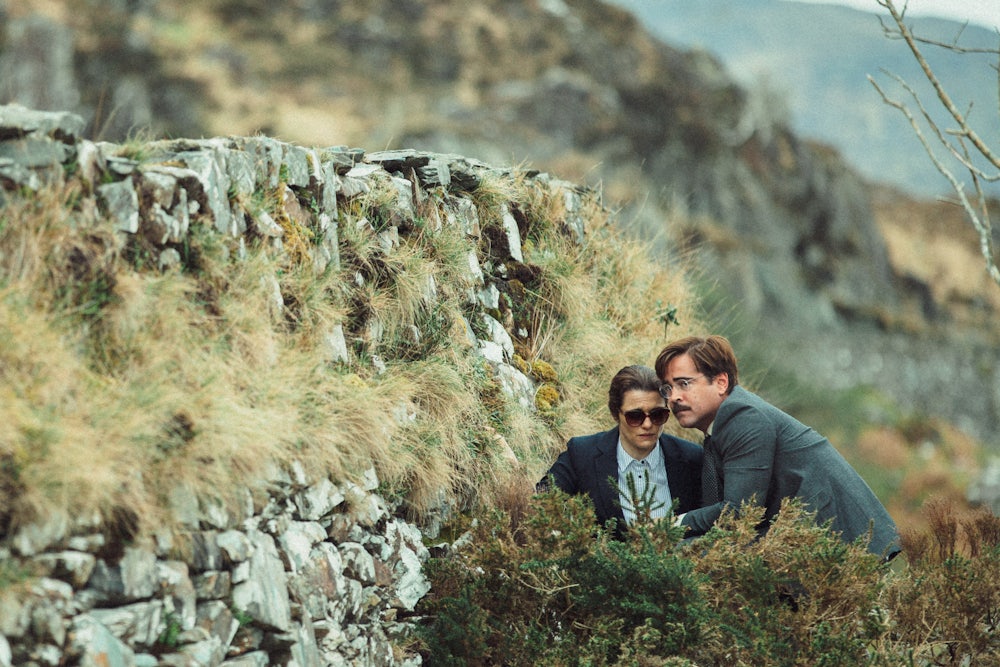The Lobster features people like no one I’ve ever met before, dialogue that could have been written for a “How To Simulate a Human Conversation” handbook, and a moral that is both cynical and completely obvious to anyone who has ever walked outside of their house for longer than five minutes. I still loved every goddamned minute of it. Greek writer-director Yorgos Lanthimos is most famous for Dogtooth, his riotous bit of insanity about a family raising children in the backyard and pretending the outside world doesn’t exist. The Lobster, though, is downright lunatic from start to finish. It is not a frenetic bit of crazy; Lanthimos’s derangement is most impressive for how restrained and controlled it is. He creates little dioramas in which only the people in his brain could possibly live, and then brings us into those worlds. There’s a lesson in this movie about love, and companionship, and the fear of being alone. But the lesson isn’t nearly as compelling as the vessel Lanthimos uses for its teaching. He’s my favorite beautiful loon.
The premise of The Lobster is so batshit that when I describe it to you, you’re going to think I’m kidding. Basically, in a world that essentially looks like the present, every human being is required to be part of a couple. (Straight and gay are equally encouraged, but bisexuality isn’t; it “causes complications,” a dispassionate bureaucrat explains.) If you end up single, you must report to a hotel in a distant forest, where you have the opportunity to meet a match. If you do not form a match after 45 days (though you can extend your time if you successfully shoot your fellow singles with a tranquilizer dart during something called “The Hunt;” it’s better if you just don’t ask), you are turned into an animal of your choosing. And that’s it. That’s the guiding principle of this whole universe. There is no dystopian militant dictator forcing this on the greater society, or some sort of crisis of population control. It simply is, and the people accept it like it’s air, or death, or a banana.
Enter David (Colin Farrell), the only character in the film who gets a name. (Also in the credits: “Limping Man,” “Lisping Man,” “Biscuit Woman,” and “Bob the Dog.”) David’s wife has just left him, so he dutifully, and wearily, reports to the hotel with his brother, who is now a dog. David, a lumpy sad-sack of a man, has essentially already given up on life but, through a series of unfortunate incidents, ends up an unlikely participant in a rebellion against the state, joining a group of woodland people led by Lea Seydoux who choose to be alone and live freely single. Just as soon as he’s getting settled with them, he meets Short-Sighted Woman (Rachel Weisz), and inconveniently falls in love.
This is all told in Lanthimos’s deadpan style, an atmosphere so dry and arid that if Steven Wright showed up, you’d think he was Jerry Lewis. Characters say exactly what they’re thinking in the flattest way possible; Lanthimos writes like he is levied a fine for every adjective. It’s a specific choice and, when it doesn’t work, like in Lanthimos’s Alps, you feel left out of a joke only the filmmaker understands. But here, the whole thing is like a hygiene play in which every interaction resembles ones we have every day, but stripped of any pretense or disguise. The people in the film are like us, just a little less so—and a little more so. I fear I’m not describing it quite right, so I’ll just show you.
This elevates the material into the realm of the fantastical while still keeping it grounded in our mundane reality, an impossible balancing act that Lanthimos somehow pulls off. For such a strange artist, Lanthimos has a lively, mischievous sense of humor, and there’s a scene involving electronic music in the forest that is one of the funniest things I’ve seen in months. But his general subject here is love, and our desperate, often undignified search for it. Lanthimos mocks our need for companionship—which is really just a search for someone like us, or at least someone who can serve our individual needs—by heightening their stakes: Our culture demands coupling up, in Lanthimos’s view, which is just a few steps away from actually demanding it. Or you’ll be turned into a crustacean.
Somehow, unfathomably, Lanthimos turns this into a love story, which saves the sharp-elbowed comedy from curdling into something deeply unpleasant. David might not necessarily find love, but he finds someone who needs him as much as he needs them—which, even if love doesn’t actually exist, is a reasonable facsimile, one that ultimately serves the same purpose. Against all odds, The Lobster ends up becoming a little bit romantic, even hopeful, as embodied by Farrell’s impotent, beaten-down, defeated, yet still somehow full-hearted performance. He makes you believe that, even in the demented universe of this film, there’s still a chance for you. This movie doesn’t have much new to say about love; its insights are far from blinding. But it does show us a new way to think about it. I smiled through the entire freaking thing. This movie is crazypants, but, man, it is my kind of crazy.
Grade: A-
Looking for more movie recommendations? Check out the latest episode of the Grierson & Leitch podcast.
Grierson & Leitch write about the movies regularly for the New Republic and host a podcast on film, Grierson & Leitch. Follow them on Twitter @griersonleitch or visit their site griersonleitch.com.
